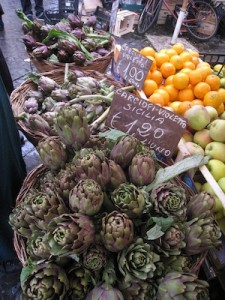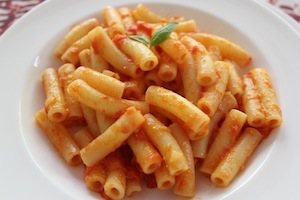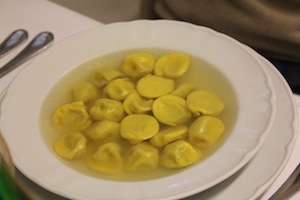I just finished reading – and watching – Mark Bittman’s tribute to the late Italian cookbook writer Marcella Hazan, and something popped out from the article: Julia Child’s comment on Italian cooking.
“I don’t get the whole thing with Italian cooking,” Child told Bittman. “They put some herbs on things, they put them in the oven and they take them out again.” Exactly, Bittman says. Esatto, I agree.
As an Italian food writer moving to the U.S. about 12 years ago, I was struck by the different way Italian, French, and American chefs and home cooks approach food, and how their countries’ history and culture shape their expectations of what good food is. I can see why Child thought Italian cooking was too easy – and why she couldn’t relate to the Italian way.
There is a huge difference between French and Italian cooking.
French cooking is complicated.
French cuisine is not famous for its peasant dishes, but for its Haute Cuisine, refined in Paris over a thousand years for the delight of the French monarchy.
It is loaded with cream, butter, anglaise, bernaise, mayonnaise, béchamel, mornay, veloutés — and puffs, choux, soufflés, and other surprising tricks that cooks had to invent at the court to amuse Royal palates.
While Europe was suffering through the Malthusian trap – the cycle of population growth, food scarcity and famine – the kings of France were spoiled by their well-furnished pantries and fabulous chefs. Cooks could freely practice their skills with unlimited great ingredients, transforming them into the most opulent dishes. People didn’t have bread? Well, let them eat… Brioches! (à la Marie Antoinette).
French Haute Cuisine is the mother of all cooking schools around the globe, including – and especially – the one Julia Child attended while in France.
In contrast, Italian cooking has been less Capital-centered. After the fall of the Roman Empire, all roads no longer led to Rome, and Italy was fragmented into small, often warring states with variable political boundaries and rulers, many of whom were invaders from elsewhere.
People used to say: “de Francia, de Spagna, purche’ se magna!” Or: from France, from Spain, it doesn’t matter, provided that we can eat!
A consequence was an extreme regionalism in food and language. Traditions could be different from one village to the next – differences born of intense rivalries, political disputes, unique histories and strong identification with one’s own village.
We didn’t have a central royal kitchen, but many small ones whose job was to deal with the greatest master of all: necessity. We had to make the best with the little we had. And what is the best? The sun-kissed bounty offered locally by the seasons and the freshness of the ingredients.
Stupendous ingredients do not need to be concealed with fancy sauces, but enhanced. Unlike the royal family of France, Italians do not like guessing what is on their plate: they like to know at first glance, and for sure, at first bite. In an Italian’s mind, if you cannot identify the ingredients, you immediately suspect that something is wrong (maybe no longer fresh) and needs to be hidden.
Italians will never tire of eating pasta with a simple tomato sauce. They are raptured when they find someone that can surpass them in cooking a simple dish.
Haute cuisine, elaborate and sophisticated, versus simple, straight forward and fresh. You choose!!!
Here in the U.S., my adopted home, there is not a single culinary tradition, but a great fusion of many different traditions.
Restaurant chefs are expected to attend a culinary school – a French rooted one. The French approach to food becomes imprinted onto the American mind. Even home cooks, who experience French-influenced food in restaurants, adopt the same mentality. They look at Italian recipes with suspicion. Ok, only five ingredients? The cook is incredulous. It tasted so delicious… There must be a secret! And that is why, following the recipe, the cook starts adding stuff. Make it new! Make it unique! So the simple five-ingredient recipe becomes a monstrous list of flavors that have little to do with each other.
Earlier, I was reading recipes on the Barilla blog and the comments and reviews below. The dish was a “simple” tortellini in brodo (tortellini with broth). The recipe per se is not really a simple one, especially if you make the tortellini and stock from scratch. It is a very traditional, festive dish that requires clear broth. Yes, you read correctly: clear broth! The reason is simple: clear broth enhances the taste of the tortellini and does not hide it.
But not a single reviewer actually followed the directions and kept it the way it is supposed to be. Not one!!! They all felt the urge to add chicken, flavorings, herbs, vegetables – you name it (ok, I’ll give you that they were cooking industrial tortellini and not handmade ones. But still).
And I am sure that these are the same people who might taste the unadorned dish in an Italian trattoria and explode in an avalanche of enthusiastic comments. But here, with the recipe in their hands, they feel the urge to add stuff — go figure!!!
I throw up my hands and think: this recipe has been around for hundreds of years, why not try it the way it is supposed to be, just once? Why do you not trust us?
The answer, I think, is the French syndrome. Fancier is better.
Or maybe Americans feel insecure, unable to trust that they can make a delicious dish with just a few ingredients. Could this be the “Food Network Complex?” Could cooking shows be making you feel incompetent compared to the contestants and celebrities? Maybe that’s it. How dare you cook, you – who has never been to cooking school. You- who does not “masterchef” the perfect knife skills. You – that still does not own a multi-billion set of very sharp knives. You’d better get it together and start complicating things!
Ferma!!! Stop!!! Take a deep breath. Get away from frenetic Times Square and come to the Piazza. Buy your great ingredients at the market and put them together simply. You earned the right to relax, and if you want to cook Italian, finally, fully … embrace that clear broth.





Excellent article! As an American home cook, who used to be a Francofile but who is now in love with Italy, I can absolutely relate to this! After my first trip to Italy, I bought many Italian cookbooks, determined to cook the food that I grew to love on my trip. I was constantly amazed at the simplicity of the recipes! I would email my friend in Italy asking what I could add to the dishes to make them better and she always replied “Niente!”
I had to un-learn my French way of cooking and embrace the simplicity of Italian cooking. I am very glad I did!
And the Cappelletti at Cocchi was one of my favorite dishes from our trip to Italy in 2010!!
I am glad you liked the article, thank you very much! And I agree, the cappelletti are amazing….:-)
Great writing and article. I have to say that you are dead on and you put into words what I have always thought. My wife was born in Trieste, Italy. Although she came to Canada as a baby, she grew up learning to cook with her Mom. Her food and recipes are easily the best I have ever had and are as great as and surpass the best restaurants we’ve been to. Her creativity combined with simplicity and fresh ingredients continue to amaze me after 22 years of marriage. The first time I watched her make a pomodoro, I thought – boring. Tomatos, basil and garlic… how could this be any good without meat and loaded with spices and herbs?!? I didn’t know the tomatos, basil and garlic were fresh from her Dad’s garden. I also didn’t know that I was in for a special treat. I was totally amazed at how great this sauce was. Of course since then, the fortunate man that I am, I have tasted many recipes that originate from Northern Italy and remain amazed at Italian cuisine and the simplicity of it’s extrodinary flavours that delight my taste buds to no end. I raise my wine glass to the Italian culture that I have learned so much from. Salute!
Thank you so much for your contribution Rick! It is amazing what nature can offer us… A simple tomato, ripen and just handpicked from the garden is a great culinary experience per se. Not many people have had the luxury to experience that… We are lucky indeed!:-) Salute!
Thank you very much for your blog.
I enjoyed reading this article.